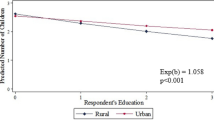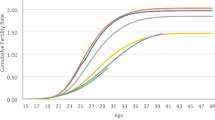Abstract
Developmental idealism (DI) contains a set of beliefs endorsing development, low fertility, and late marriage and causal connections between development, fertility, and marriage. In this paper, we investigate to what extent DI beliefs about connections of economic development with marriage and childbearing are widespread in Turkey. We also compare the views of people concerning these linkages generally with their views of the linkages in their own country. We also investigate whether such factors as regional location, ethnicity, secularism, education, gender, age, marital status, and number of children influence the acceptance of DI beliefs concerning marriage and fertility in Turkey. We present new data from a national survey of urban Turks conducted in 2014. Our analyses reveal substantial evidence that the ideas of DI have been circulated widely among ordinary people in Turkey. Our results also indicate that Turkish people make little distinction between DI as it relates to their own country and DI as it relates to more general or abstract considerations. Moreover, our analyses suggest that region of residence, age, education, gender, marital status, and fertility were related in substantial and statistically significant ways to DI beliefs. However, for such factors as education, gender, marital status, and fertility, we found that the estimated effects were in a different direction from our theoretical predictions. We argue that these findings are important contributions to DI research and that our study raises significant new questions that deserve further research.
Similar content being viewed by others
References
Abbasi-Shavazi, M. J., Nodoushan, A. Askari, & Thornton, A. (2012). Family life and developmental idealism in Yazd, Iran. Demographic Research,26(10), 207–238.
Akın, A. (2007). Emergence of the family planning program in Turkey. In W. C. Robinson & J. A. Ross (Eds.), The global family planning revolution: Three decades of population policies and programs. Washington, DC: World Bank.
Akın, A, & Aykut, N. B. (2011). Araştırmadan Uygulamaya Nüfus Politikalarının Oluşmasında Türkiye Deneyimi, Sağlık ve Toplum Dergisi, 3.
Allendorf, K. (2013). Schemas of marital change: From arranged marriages to eloping for love. Journal of Marriage and Family,75(2), 453–469.
Allendorf, K., & Pandian, R. K. (2016). The decline of arranged marriage? Marital change and continuity in India. Population and Development Review,42(3), 435–464.
Allendorf, K., & Thornton, A. (2015). Caste and choice: The influence of developmental idealism on marriage behavior. American Journal of Sociology,121(1), 243–287.
Bachrach, C. A. (2013). Culture and demography: Reluctant bed fellows or new frontier. Demography,51(1), 3–25.
Başgöz, İ. (1973). The new education and populism. In K. Karpat (Ed.), Social change and politics in Turkey: A structural-historical analysis. Brill: Leiden.
Binstock, G., & Thornton, A. (2007). Knowledge and use of developmental thinking about societies and families among teenagers in Argentina. Demográfia,50(5), 75–104.
Binstock, G., Thornton, A., Abbasi-Shavazi, M. J., Ghimire, D., Xie, Yu., & Yount, K. (2013). Hierarchies Influences on the knowledge and beliefs of ordinary people about developmental. International Journal of Comparative Sociology,54, 325–344.
Çınar, A. (2005). Modernity, secularism and Islam in Turkey: Bodies, places and time. Minneapolis: University of Minnesota Press.
Çopur, Z., & Koropeckyj-Cox, T. (2010). University students’ perceptions of childless couples and parents in Turkey. Journal of Family Issues,31(11), 1481–1506.
Dorius, S. F. (2016). Chinese and world cultural models of developmental hierarchy. Chinese Journal of Sociology,2(4), 577–608.
Dumont, P. (1984). The origins of kemalist ideology. In J. Landau (Ed.), Ataturk and Modernization in Turkey (pp. 25–45). West view: Colorado.
Eisenstadt, S. (2000). Multiple modernities. Daedalus,129(1), 1–29.
Erder, N. (2002). Türkiye’de Siyasi Partilerin Yandas/Seçmen Profili, 1994-2002. Istanbul: TUSES Publications.
Eryurt, M. Ali, & Koç, İ. (2012). Internal migration and fertility in Turkey: Kaplan-Meier survival analysis. International Journal of Population Research,2012, 1–11.
Esmer, Y. (2012). World Values Survey, Sampling Design. http://www.worldvaluessurvey.org/WVSDocumentationWV6.jsp?COUNTRY=875WV6_
Fişek, N., & Shorter, F. (1968). Fertility control in Turkey. Demography,5(2), 578–589.
Göle, N. (1996). The forbidden modern: civilization and veiling. Michigan: University of Michigan Press.
Gülalp, H. (2005). Enlightenment by fiat: Secularization and democracy in Turkey. Middle Eastern Studies,41(3), 51–372.
International Fund for Agricultural Development (IFAD). (2016). Republic of Turkey Country Programme Evaluation, Policy Report, No. 4064-TR. Retrieved November 25, from, 2017 https://www.ifad.org/documents/10180/b2ad1f51-88df-4d5a-88e3-9e5aba96ac5a
Işıkoğlu, M., Şenol, Y., Berkkanoğlu, M., Özgür, K., Dönmez, L., & Stones-Abbasi, A. (2006). Public opinion regarding oocyte donation in Turkey: First data from a secular population among the Islamic world. Human Reproduction,21, 318–323.
Kağıtçıbaşı, Ç. (1996). Family and human development across cultures: A view from the other side. NJ: Lawrence Erlbaum.
Kavas, S. (2015). Wardrobe modernity: Western attire as a tool of modernization in Turkey. Middle Eastern Studies,51(4), 515–539.
Kavas, S., & Thornton, A. (2013). Adjustment and hybridity in Turkish family change: Perspectives from developmental idealism. Journal of Family History,38(2), 223–241.
Kazamias, A. (1966). Education and the quest for modernity in Turkey. Chicago: University of Chicago Press.
Kemal, M. (1923). Atatürk’ün Söylev ve Demeçleri, II, (Ankara: Türk Tarih Kurumu Basımevi, 1997).
Konda, (2011). Kürt Meselesinde Algı ve Beklentiler. Istanbul: İletişim.
Lai, Q., & Thornton, A. (2015). The making of family values: Developmental idealism in Gansu-China. Social Science Research,51, 174–188.
Mandelbaum, M. (1971). History, man, and reason: A study in nineteenth-century thought. Baltimore: The John Hopkins Press.
Melegh, A., Kiss, T., Csánóová, S., Young-DeMarco, L., & Thornton, A. (2016). The perception of global hierarchies: South-Eastern European patterns in comparative perspectives. Chinese Journal of Sociology,2(4), 497–523.
Melegh, A., Thornton, A., Philipov, D., & Young-DeMarco, L. (2013). Perceptions of societal developmental hierarchies in Europe and beyond: A Bulgarian perspective. European Sociological Review,29(3), 603–615.
Metiner, T. (1965). Turkey. In B. Berelson (Ed.), Family planning and population programs: A review of world developments. Chicago: The University of Chicago Press.
Özbay, F. (1985). Transformation of the socio-economic structure and changing family functions in rural Turkey. In T. Erder (Ed.), Family in Turkish Society. Turkish Social Science Association: Ankara.
Özbay, F., & Shorter, F. (1970). Turkey: Changes in birth control practices, 1963 to 1968. Studies in Family Planning,51, 1–15.
Özbilgin, M., & Healy, G. (2004). The gendered nature of career development of university professors: The case of Turkey. Journal of Vocational Behavior,64, 358–371.
Özdalga, E. (2005). Introduction. In E. Özdalga (Ed.), Late ottoman society: The intellectual legacy. New York: Routledge.
Peker, M. (1983). Nüfus Politikaları. Ankara: Devlet Planlama Teskilati Yayinlari.
Radikal, Agenda 22 Dec 2014, p9.
Saktanber, A. (2002). Living Islam: Women, religion and the politicization of culture in Turkey. London: I.B. Tauris.
Sayari, S., & Bruce, H. (1991). Urbanization and insurgency: The Turkish Case, 1976-1980. Santa Monica, CA: RAND Corporation.
Sirman, N. (2007). Constituting the modern family as the social in the transition to Empire to Nation-State. In A. Frangoudaki & Ç. Keyder (Eds.), Ways to modernity in Greece and Turkey: Encounters with Europe, 1850-1950. London: I.B. Tauris.
Thornton, A. (2001). The developmental paradigm, reading history sideways and family change. Demography,38, 449–465.
Thornton, A. (2005). Reading history sideways: The fallacy and enduring impact of the developmental paradigm on the family life. Chicago: The University of Chicago.
Thornton, A., Achen S., Barber J., et al. (2010). Process and method for creating questions and protocols for an international study of developmental idealism. In M. Braun, et al. (Eds.), Survey methods in multinational, multiregional and multicultural contexts (pp. 59–74). NJ: Wiley.
Thornton, A., Binstock, G., Abbasi-Shavazi, M. J., Ghimire, D., Gjonca, A., Melegh, A., et al. (2012a). Knowledge and beliefs about national development and developmental hierarchies: The viewpoints of ordinary people in thirteen countries. Social Science Research,41, 1053–1068.
Thornton, A., Binstock, G., & Ghimire, D. (2008). International dissemination of ideas about development and family change. In R. Jayakody, A. Thornton, & W. Axinn (Eds.), International family change ideational perspectives (pp. 19–44). New York: Lawrence Erlbaum.
Thornton, A., Binstock, G., Young-DeMarco, L., Mitchell, C., Yount, K., & Xie, Yu. (2016). Evaluating the measurement reliabilities and dimensionality of developmental idealism measures. Chinese Journal of Sociology,2(4), 609–635.
Thornton, A., Binstock, G., Yount, K. M., Abbasi-Shavazi, M. J., Ghimire, D., & Xie, Yu. (2012b). International fertility change: New data and insights from the developmental idealism framework. Demography,49(2), 677–698.
Thornton, A., Dorius, S. F., & Swindle, J. (2015). Developmental idealism: The cultural foundations of world development programs. Sociology of Development,1(2), 277–320.
Thornton, A., Dorius, S. F., Swindle, J., Young-Demarco, L., & Moaddel, M. (2017). Middle eastern beliefs about the causal linkages of development to freedom, democracy, and human rights. Sociology of Development,3(1), 70–94.
Thornton, A., Ghimire, D. J., & Mitchell, C. (2012c). The measurement and prevalence of an ideational model of family and economic development in Nepal. Population Studies: A Journal of Demography,66(3), 329–345.
Thornton, A., & Philipov, D. (2009). Sweeping changes in marriage, cohabitation and childbearing in Central and Eastern Europe: New Insights from the Developmental Idealism Framework. European Journal of Population,25, 123–156.
Thornton, A., Pierotti, R. S., Young-DeMarco, L., & Watkins, S. (2014). Developmental idealism and cultural models of the family in Malawi. Population Research and Policy Review,33, 693–716.
Thornton, A., & Xie, Yu. (2016). Developmental idealism in China. Chinese Journal of Sociology,2(4), 483–496.
Turkish Demographic and Health Survey (TDHS). (2013). Demographic transition in Turkey. Ankara: Hacettepe University Institute of Population Studies. http://www.hips.hacettepe.edu.tr. Accessed 17 Sep 2016
Turkish Statistical Institute (Turkstat). (2016). Population statistics. Retrieved November 15, from, 2016. http://www.turkstat.gov.tr/UstMenu.do?metod=temelist
United Nations Development Programme. (2015). United nations development report 2015: Work for human development. New York: United Nations.
Wallerstein, I. (1991). Unthinking social science: The limits of nineteenth century paradigms. UK: Polity.
Winter, M. (1984). Modernization of education in kemalist Turkey. In J. Landau (Ed.), Atatürk and the modernization of Turkey (pp. 183–194). Colorado: West view.
Xie, Yu., Thornton, A., Wang, G., & Lai, Q. (2012). Societal projection: Beliefs concerning the relationship between development and inequality in China. Social Science Research,41, 1069–1084.
Yegenoglu, M. (1998). Colonial fantasies: Towards a feminist reading of orientalism. Cambridge: Cambridge University Press.
Yount, K. M., & Rashad, H. (2008). Family in the Middle East: Ideational change in Egypt, Iran and Tunisia. Oxford: Routledge.
Acknowledgements
This study was supported by a grant from the Scientific and Technological Research Council of Turkey (TUBITAK), (SOBAG 3501, Grant #113K073). We appreciate the staff including the interviewers and supervisors of research firm, Frekans, in Istanbul, for their work in the collection and processing of the data. We thank Hüseyin Kavas and Eban Arıkan for their input into the data analysis. We thank the Turkish respondents who provided the data for this research. Finally, we would like to thank the anonymous reviewers at Population Research and Policy Review (PRPR) for their comments and critique.
Author information
Authors and Affiliations
Ethics declarations
Conflict of interest
The authors declare that they have no conflicts of interest.
Additional information
Publisher's Note
Springer Nature remains neutral with regard to jurisdictional claims in published maps and institutional affiliations.
Rights and permissions
About this article
Cite this article
Kavas, S., Thornton, A. Developmental Idealism and Beliefs About Marriage and Fertility in Turkey. Popul Res Policy Rev 39, 47–75 (2020). https://doi.org/10.1007/s11113-019-09525-2
Received:
Accepted:
Published:
Issue Date:
DOI: https://doi.org/10.1007/s11113-019-09525-2




